In 1838, Georgetown University included 272 enslaved people on a bill of sale to plantations in Louisiana in order to save the university from financial ruin. We now know that the number of individuals sold during this sale is at least 314. Tradition claimed that all perished on the way to Louisiana, but they survived – many of them through the Civil War living long enough to see emancipation. Over 8,000 of their descendants are now known and the numbers continue to grow. It is a story of perseverance and survival. If you think you may be a part of this amazing legacy, here are some tips and resources to help aid you on your search to make a connection and add to your family story.
How to Find Your GU272 Ancestor
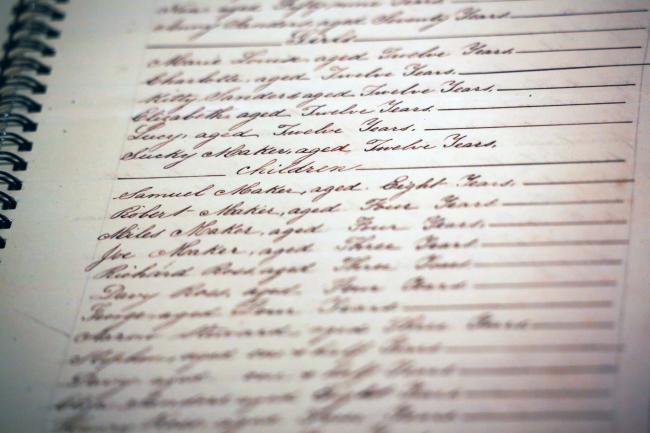
Common Clues of a Connection
The Georgetown Memory Project created a list of clues that may help you determine if you could be related to the GU272. Keep in mind that these are just some commonalities amongst GU272 descendants and that not all descendants will share any or all of these traits. Please view the original list for more details including a list of surnames with known connections to the GU272, but in summary these things stand out about GU272 descendants:
Your family is black or mixed race
Your family or ancestors were Roman Catholic
Your family has historic ties to Maryland
Your family has historic ties to Southern Louisiana, namely Iberville Parish, Ascension Parish, Terrebonne Parish, and/or St. Landry Parish.
Family Lore tells you:
Your ancestors came to Louisiana from Maryland, Baltimore, or “up north”
You ancestors came to Louisiana on a ship called the Katherine Jackson
Your ancestors were enslaved by Jesuits or the Catholic Church
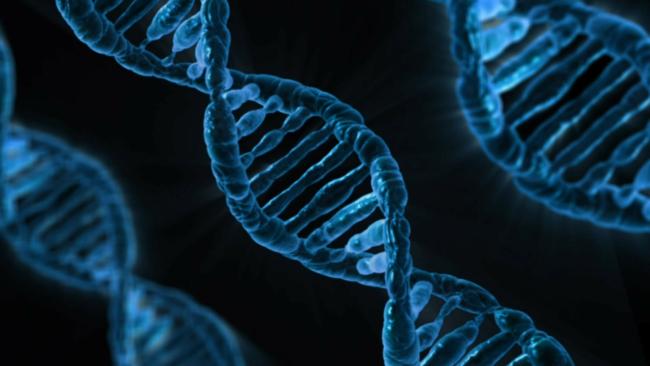
DNA Connections
DNA alone will not tell you if you are a descendant of one of the GU272, however, it has been a useful tool that descendants have used to make connections and determine if they are likely connected to the GU272. Currently, the Georgetown Memory Project is conducting a DNA study focused on the GU272 through AncestryDNA on Ancestry.com. There are over two dozen confirmed descendants that are participants in this study, mostly from families in Louisiana. DNA has proved helpful in proving the connection between the Maryland descendants and the families that were transported to Louisiana.
If you think you may have a GU272 connection, you can do a test with AncestryDNA to use this as another tool in your search as you trace your family through the paper trail. Once you have test, look through your matches for kits “managed by Georgetown Project.”
If through a DNA test you notice one or several matches to known participants in the Georgetown DNA project and your family has some of the “common clues” above, there is a strong possibility that you are a descendant. If you need more assistance making a connection, one of the GU272 organizations may be able to assist you further.
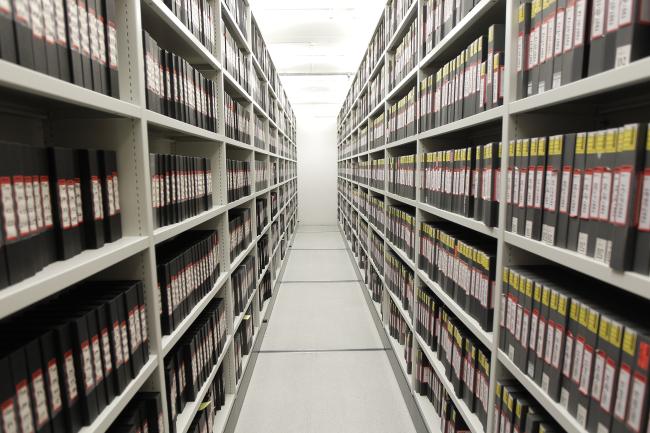
Repositories
Georgetown Slavery Archive is a digital archive housed by Georgetown University that was created by the school’s Working Group on Slavery, Memory, and Reconciliation. Here you will find digital copies of original do
The Jesuit Plantation Project is a digital archival project of the American Studies Program at Georgetown University and is a precursor to the Georgetown Slavery Archive. This is not as attractive or as organized as the Georgetown Slavery Archive, but it does have some helpful research tools, including short profiles of the 272 and spreadsheets or “Inventory” outlining the family groups among those sold in 1838. It also includes a bibliography with some works that may prove helpful in rounding out your genealogical research.
Booth Family Center for Special Collections is the repository on Georgetown University’s campus where all the original documents included in the Georgetown Slavery Archive can be accessed.
Louisiana State Archives in Baton Rouge, it holds several record sets that are useful to researching the families that were transported to Louisiana. These include vital records, military records, land records, and other state and parish records.
Since many in Louisiana remained Catholics, you will want to search for Sacramental records in Catholic Diocese archives in Louisiana including the Diocese of Baton Rouge, Department of Archives and the Archdiocese of New Orleans Archives.
Maryland State Archives includes various government records that are useful to research on the GU272 families that remained in Maryland. Much of the research on the “Lost Jesuit Slaves” in Maryland was conducted by Malissa Ruffner at the Maryland State Archives where she examined documents such a tax assessment records, land records, and vital records.
Parish Courthouses in Louisiana can also be essential for locating vital record, land records, or other parish related records that could be useful to your search. Depending on where your ancestors were, you may want to examine records in the following parish courts:
Ascension Parish (Donaldsonville)
Assumption Parish (Napoleonville)
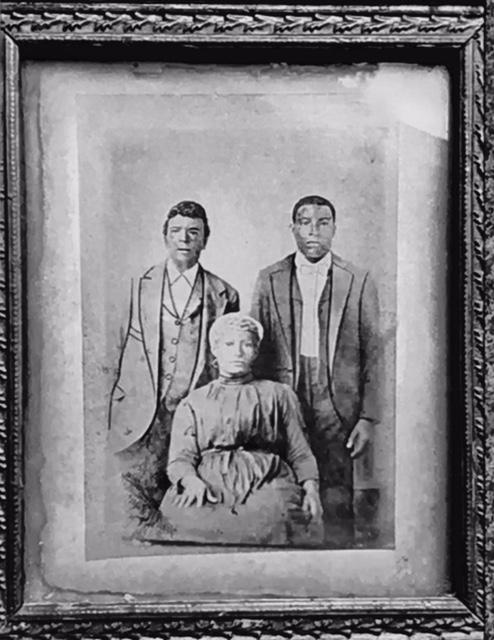
Online Sources
Georgetown University’s Working Group on Slavery, Memory, and Reconciliation is a group formed by Georgetown’s president John J. DeGioia in 2015 to “reflect upon our University’s history and involvement in the institution of slavery.” This group contributed to what would become the Georgetown Slavery Archive. This is an old link and while there is not much on this website, you can view the University’s public messages to the community, share your own ideas, and view a recommended reading list.
Judy Riffel: Professional Genealogist, Raton Rouge, Louisiana: Judy has served as the lead genealogist for the research conducted by the Georgetown Memory Project. Judy includes a list of links to media articles covering the GU272 and useful repositories in Louisiana.
African Roots is a website built by GU272 descendant Patricia Bayonne-Johnson who hired Genealogist Judy Riffle to help you research her Iberville Parish family and discovered her connection to the enslaved peoples sold by Georgetown University. Her site covers her other ancestral lines as well, but does include information on her Butler family – her direct ancestors Nace and Biby Butler were included in the Georgetown sale. Patricia also has extensive knowledge of descendants of the Butler line that may not be include in the American Ancestors GU272 database. She is a good person to contact if you are looking for more information on the Butler family.
The Lost Jesuit Slaves of Maryland with Richard Cellini, Esq. - Broadcast in History An interview with Richard Cellini on the GU272 that remained in Maryland.
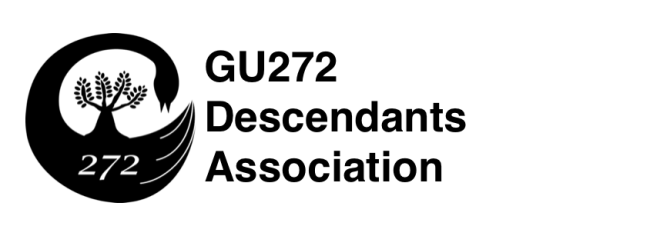
GU272 Organizations
Georgetown Memory Project – Organized by Georgetown University Alumni, Richard Cellini, who wanted to know what happened to the GU272. He hired Louisiana Genealogist, Judy Riffle, to conduct research on the GU272 and their descendants. Officially, “The GMP is an independent group founded by friends, allies & alumni of Georgetown University, aligned with the Georgetown slaves and their living descendants” and their mission includes identifying the people sold in 1838, locating their descendants, acknowledging them as members of the Georgetown family, and honoring their sacrifice and legacy.
GU272 Descendants Association – This is a non-profit organization established and operated by GU272 Descendants “dedicated to preserving the memory, commemorating the lives and restoring the honor of the 272 enslaved people sold by the Jesuits…” Their Facebook Page
GU272 Isaac Hawkins Legacy (Facebook page) – “The Isaac Hawkins Legacy site is the voice of two hundred of the direct descendants of Isaac Hawkins, one of the 272 black people who were enslaved and sold by Maryland Jesuits in 1838 to rescue fledgling Georgetown College from financial ruin…the purpose of this site is to educate, to generate awareness, and to remind the university and the nation that justice is still owed to the descendants of the GU272.”
Legacy of the GU272 Alliance (Facebook page) – “Many of the sold slaves ended up in Maringouin (Cajun French for “mosquito”), a little town outside Baton Rouge, Louisiana that is desperately impoverished. Of the roughly 1,110 people living there, approximately 900 are direct descendants of the human beings whose sale price bolstered the university’s endowment. This website traces the descendants of Cornelius (Neely) Hawkins, one of the slaves that wound up at the West Oak Plantation in Maringouin.”
The Campbell Family has a private organization specific for the Campbell branch of the family with an active Facebook group. If you are a Campbell descendant interested in joining, you could contact the group at Gr8Heritage@gmail.com.
Georgetown University’s Working Group on Slavery, Memory, and Reconciliation is a group formed by Georgetown University’s president John J. DeGioia in 2015 to “reflect upon our University’s history and involvement in the institution of slavery.” The group was directed to make "make recommendations to help guide the University’s ongoing work related to slavery and its legacies." Since its inception, this group contributed to what would become the Georgetown Slavery Archive and hosted several events with descendants to increase communications between the descendant community and the university.
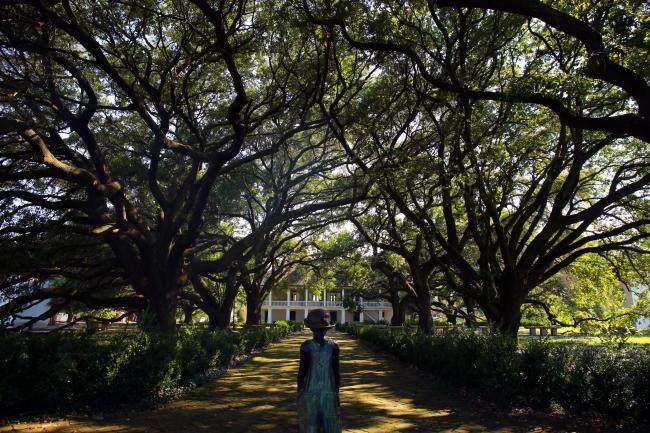
Museums
The following are museums in Louisiana that have exhibits or interpretive spaces dedicated specifically to the GU272 or highlight slavery in Louisiana. Please see our “Cultural and Historical Institutions” document in the “Research Help” tab for a more extensive list of institutions across the country that focus on African American history and culture.
River Road African American Museum, Donaldsonville, Louisiana. The museum’s mission is “To educate visitors about the history and culture of African Americans in the rural communities of South Louisiana through the collection, preservation, and interpretation of art, artifacts, and historic buildings.” They hold resources that may be helpful if you are searching for African American ancestors in south Louisiana where many of the descendants of the GU272 remained.
Finding Our Roots African American Museum, Houma, Louisiana. The museum’s mission is to “This landmark museum is the first exhibition and education venue dedicated to African American history and culture in the Terrebone parish. It aims to educate and to raise awareness of the significance of African American history to an understanding of the overall story of America as experienced in the Bayou Region parishes of Terrebonne, Lafouche and St. Mary…and beyond.” They currently have an exhibition on the GU272.
Whitney Plantation, Edgard, Louisiana. "Whitney Plantation is the only plantation museum in Louisiana with an exclusive focus on the lives of enslaved people. Visit Whitney’s memorials and restored buildings to enter the world of a Louisiana sugar plantation and to remember those who built and worked this property. On your walking tour, your guide shows you through slave cabins, a freedmen’s church, detached kitchen and outbuildings, a 1790s owner’s house and memorials built to honor the enslaved." This is a great museum to visit to gain a glimpse into what live on a sugar plantation must have been like for the GU272.
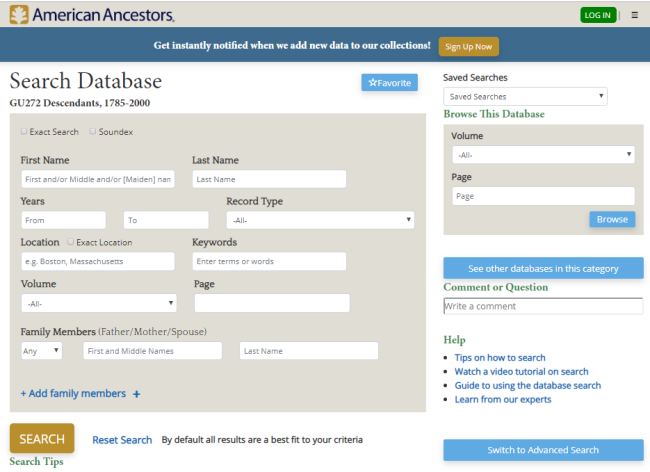
Using American Ancestors Database Descendants of the GU272
Access the Descendants of the GU272 database at AmericanAncestors.org/search
This database provides the indexed genealogies of the descendants of the 272 Slaves sold by Georgetown University in 1838. This database is produced in a partnership with the Georgetown Memory Project.
This database is organized into volumes. Most volumes are based on a Register-style report on the descendants of the original families. The volume name will specify the name of head of the family followed by the group number in parenthesis. For example: "Campbell, Adaline (Group 34)". This contains the report of the descendants of Adaline Campbell, who is the 34th family. The final volume is titled Sources. It contains indexed images of birth, marriage, and death certificates for people who are covered in the other volumes.
Each report is limited to a maximum of 4 generations. Any person born on or after 1 Jan 1919 is excluded completely from the report for privacy reasons. The record types that are indexed include; birth, baptism, marriage, death, and burial. All available names, including parents and spouses are included in the index and are searchable.
You can search the database using the following searchable fields:
First and/or Last name
Year
Record Type (Birth, Baptism, Marriage, Death, or Burial)
Location
Family Members (Father/Mother/Spouse)
Keywords
Search Tips
When using the “Family Members” search with a name search use the first name of the family member only. Using the last name as well may not return all results.
Use the “Browse” option if you already know your GU272 ancestor and quickly want to access the Register-style report of their descendants. Each volume is one family group.
Original Sources, such as birth, marriage, and death records will be returned in searches for individuals where they are available.
GMP Codes can be searched in the “keyword” search.
GMP Codes for each individual are included in the Register reports for each family.
You can use wild card characters in the name fields including “?” to match any single character and “*” to match any number of characters two or more.
AmericanAncesTREES is FREE, but you do have to create a guest account to use it.
In addition to the searchable database, each of the family groups can be viewed in AmericanAncesTREES.
